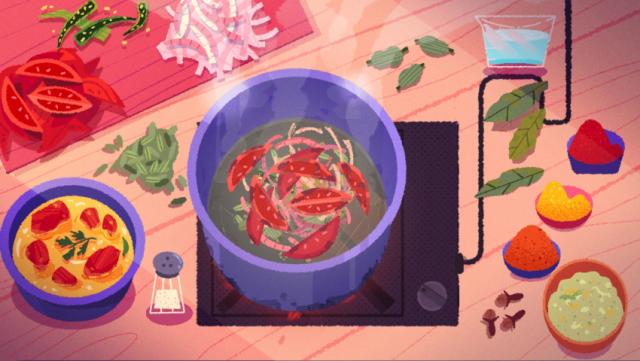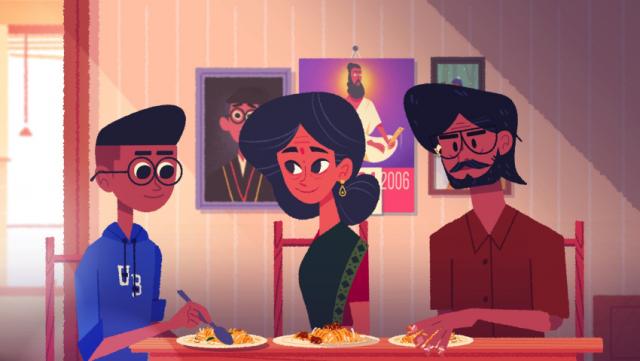[ad_1]

by
Lee Mehr
, posted 3 hours ago / 363 Views
Reviewer’s Note: Given how intertwined the story and gameplay are, to make certain insights I will have to bring up SPOILERS. Read on at your own risk.
Speaking with Eurogamer, Visai Games’ lead writer, designer, & programmer Abhi noted how immigration stories tend to focus on second-generation children; it’s not a bad thing per se, but rather there’s untapped potential in examining the original migrants’ perspective – the ones who “…leave their country at age 40 or 50, and move to a brand new place.” That different generational emphasis is immediately felt with the title character, Venba, dragging herself to the kitchen to make idlis for her husband, Paavalan, before he runs to work. Assisting her is one of the few belongings this Indian couple brought with them to Canada: Venba’s mother’s cookbook.
This heavily-worn collection of Tamil recipes also marries with the couple’s circumstances. Due to the cookbook’s condition, one or two steps are completely illegible. So, your mission is two-fold between mechanically repeating basic instructions and figuring out the rest. Likewise, with the wonderful announcement of Venba’s pregnancy, these two have to navigate parenthood with an incomplete manual; unlike these cooking intervals, there’s no simple reset.

Exploring this dynamic through interwoven cooking segments is an ingenious way to communicate this family’s trials and tribulations. The mere mention of the couple’s boy, Kavin, is a sore spot for him when “Kevin” is more convenient for his schoolmates. Even his prepared lunches cause some embarrassment, since opening his lunchbox launches an array of wild aromas. There’s this underlying tension between wanting to fit in and holding onto important cultural markers. A couple of the early dishes highlight that by emphasizing the craftsmanship required to prepare them.
One early thought I had was how… alien certain foods felt to make. That’s not to denigrate Tamil cuisine, but rather to appreciate how some of the unorthodox methodologies to make their food could be perfectly translated into a sci-fi backdrop. Little tactile tricks, like properly adjusting vent holes so the built-up steam can evenly heat every idli, give a tiny dopamine hit in learning a unique cooking trick. It’s also reinforced by great audio-visual design too. The intense crackling from cooking fish, straining flour, and more authentically capture a slice of Little India. One of my worst (or perhaps best?) ideas was playing through on a near-empty stomach.

It’s a shame the experience only left me half full though. I don’t strictly mean a dollar-per-hour weight either – though ~90 minutes for $14.99 creates some uncomfortable tension too; no, I mean the tightrope between a hurried or succinct pace. There are some nice storytelling 101 spices blended in – little visual staples communicating the couples’ ups and downs – but the menu promised something more than one of those courses from a pretentious restaurant.
Too much connective tissue is lost from expansive time-jumps. The gap from the first meal to the second suggests roughly 6 years have passed, and it keeps to that pace until the second half. You’ll feel more like a time-traveling squatter than wholly ingraining yourself within this family’s world. The immigrant story tropes like the child growing more distant from both his family and culture over time feel too much like a procedural highlight reel instead of a winding organic tale. You can intuitively feel for the father’s occupational setbacks and a violent run-in he has with someone, but it’s still missing those in-between moments for dramatic heft. Some story beats may be palpable (though the mugging scenario is awkwardly structured) and yet not sufficiently resonate since everything feels like a quick “…and then this happened” plot structure.
This concurrently applies to the gameplay appetizer as well. I wanted to test my deft mechanical and culinary deduction skills for more than 7 meals. While I have to plead ignorance on Tamil cuisine, Venba’s cookbook suggests it’s a rich tapestry with more fun contraptions to play with. Why not take more advantage of its exotic potential? It’s a shame given how inviting it feels to play too. The only mechanical irritation is the dreaded controller-cursor; fortunately, it’s one of the least-offensive in recent memory – even though a couple of specific moves do feel a tad finicky.

Past those negatives, part of Venba’s design also walks that uncomfortable tightrope of a tonal mismatch. It’s funny because for all of the wonderfully warm colors (especially when cooking) and Alpha Something’s animated soundtrack, something’s off in placing Venba in cooking scenarios where she – i.e. the player-character – can continually mess up. The established premier chef of the family needing a hint system seems to get the wrong point across, especially with certain story beats. I get how odd it seems to discuss potential “ludonarrative dissonance” within cooking challenges, of all places, but that also highlights why the latter-half’s obstacles feel more thematically cohesive. When someone else has to wear the apron, that character’s narrative obstacles and connected gameplay tempo find truer harmony.
In the end, Venba is a special case of over-relying on flavorful spices – music, art design, etc. – to compensate for paltry servings. Which is a shame to say because so much modern media likes to overindulge us with content slop for its own sake. But this complaint extends beyond a consumerist mindset for me; here, it’s more about how undercooking limits the impact of otherwise well-meaning themes while exacerbating what some may consider design naan-issues. Since the overarching immigrant tale only has time for familiar tropes, it winds up feeling – ironically – a touch too stale when the credits roll. An easy way to curry favor with any chef is loudly hankering for seconds; in Visai Games’ case, I’m still left pleading for firsts.
Contractor by trade and writer by hobby, Lee’s obnoxious criticisms have found a way to be featured across several gaming sites: N4G, VGChartz, Gaming Nexus, DarkStation, and TechRaptor! He started gaming in the mid-90s and has had the privilege in playing many games across a plethora of platforms. Reader warning: each click given to his articles only helps to inflate his Texas-sized ego. Proceed with caution.
This review is based on a digital copy of Venba for the XS
More Articles
[ad_2]
Source link











































